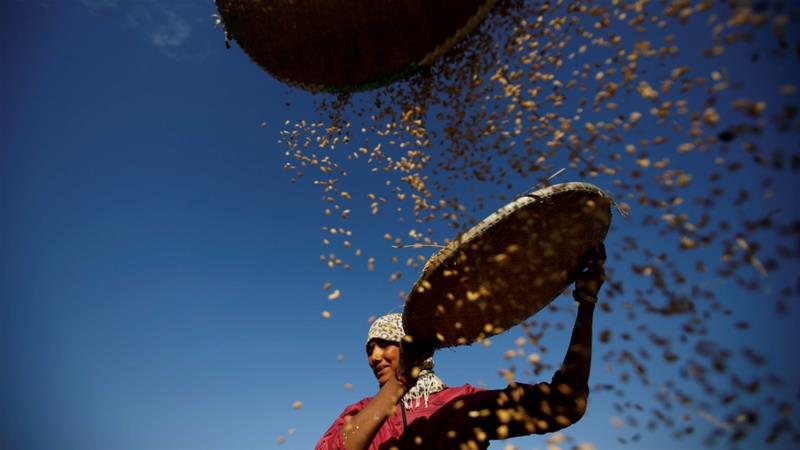Human society faces a moment of reckoning. The coronavirus pandemic has brought humanity to its knees and bared its many faultlines. No country has been spared.
As scientists scramble to find a vaccine that could rein in the pandemic, many countries have imposed lockdowns requiring people to stay at home. But for many of the poor, this is a challenge.
Slum-dwellers, living in crammed shacks, cannot abide by social-distancing measures demanded by governments, nor can they follow strict hygiene, as access to running clean water is scarce. The lockdowns have deprived millions of daily wage workers in cities from their income, pushing many families to the verge of starvation.
People living in rural areas are also struggling. While many of us peasants continue to work our fields, we are finding it increasingly difficult to sell our produce. Governments have shut down local markets which has left many of our crops rotting in the fields.
Small-scale fisher-folk have also suffered. Even if they are able to get to their fishing grounds in the sea, lakes or rivers, they too are finding it difficult to distribute their fish. The same is true for pastoralists and family-owned dairy farms.
Small-scale livestock farmers and peasant families with domestic animals are also worried about finding enough feed for them.
While disruption of local small-scale food production has indeed been significant, the large-scale food industry which relies on international supply chains to function has been hit even harder because of travel bans affecting labour supply and international distribution.
Indeed, the pandemic has highlighted yet another ill of countries becoming too dependent on large international food industries. For decades, governments did little to protect small farms and food producers which were pushed out of business by these growing dysfunctional corporate giants.
They stood idle as their countries grew increasingly dependent on a few major suppliers of food who forced local producers to sell their produce at unfairly low prices so corporate executives can keep growing their profit margins. They remained silent as evidence piled up of large agribusiness contributing disproportionately more than traditional small-scale farming to greenhouse gas emissions and global warming.
Local peasant markets gave way to supermarkets, and big businesses and their commodity trading partners took control of the global food system, disregarding all principles of agroecology and food sovereignty.
The aggressive expansion of industrial food production has also increasingly put human health in harm’s way. Apart from the overuse of chemicals and over-processing of foods, which makes them less nutritious and more harmful, it has also resulted in a major increase in zoonotic diseases – those caused by pathogens which jump from animals to humans (just like COVID-19).
Today, food security in countries around the world is increasingly tied to big industrial food production. Singapore, for example, imports some 90 percent of its food; Iraq, which used to be the breadbasket of the Middle East, also gets more than 80 percent of its food from abroad.
The dangers of this dependency on international food supply chains are now coming to the fore, as communities around the world are facing the prospect of hunger. The World Trade Organization (WTO) and the World Health Organization (WHO) have already warned of the risk of worldwide “food shortages”.
The COVID-19 pandemic is pushing many to recognise the importance and urgency of food sovereignty – the right of people to determine their own food and agricultural systems and their right to produce and consume healthy and culturally appropriate food.
Countries like Nepal, Mali, Venezuela and several others have already recognised food sovereignty as a constitutional right of their people. Other states should follow suit. Food sovereignty of the people is the best defence against any economic shock.
It addresses the most urgent and pressing need of the people, which is to have healthy, nutritious and climatically appropriate food, grown in a locality or a neighbourhood, where they most likely know the people who produce it. Agroecological and localised peasant production of food respects and co-exists with our natural surroundings. It keeps away from harmful pesticides and chemical fertilisers.
The hard-wired competitive logic of a free market economy should stop defining international trade. Human principles of solidarity and camaraderie should determine global trade policies and networks. For countries where local production is impossible or gravely challenging due to climatic or other conditions, trade should rely on cooperation and not competition.
That is why, for years, peasant movements, such as La Via Campesina, around the world have campaigned and demanded to keep agriculture out of all free trade negotiations.
Any order that promotes life over profits must become the bedrock of human civilisation. We are not living in such a world now, but we surely can.
As the world reels under the fallout of a pandemic, now is the time to start building an equal, just and liberal society that embraces food sovereignty and solidarity.
This article by Jeongyeol Kim & Pramesh Pokharel first appeared on the Al Jazeera website, on 26 April 2020). The authors of this piece are also the International Coordinating Committee members of La Via Campesina.

